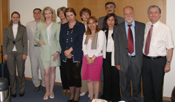 |
| Photo from the recent meeting in Brussels |
13/07/2007
The search for research organisations and individual researchers from Russia and Eastern European countries involved in science and cutting edge technology is now possible thanks to a new database available at http://researchers.nisnest.gr/.
This new service is particularly useful for identifying partners from Russia and Eastern European countries in order to submit joint proposals under FP7.
The database has been developed as part of the NIS-NEST project, an EU-funded project coordinated by the National Documentation Centre (EKT) and financed by FP6 (the NEST horizontal programme). This project, which fosters cooperation between the EU, Russia and Eastern European countries, involves organisations from Greece, France, Russia, the Ukraine, Belarus and Moldavia.
The online database includes information on research bodies, universities, institutes, businesses and individual researchers involved in science and cutting edge technologies. Visitors to the database can search for partners based on the field of science, the country or the language they are interested in. The search results include information profiling the bodies, their fields of activity and prior experience in European and international research programmes and contact details.
The database is constantly being updated with new data directly fed into it digitally by researchers and organisations from Russia,Moldova, Ukraine, Belarus and other Eastern European Countries. A search guide and FAQ are available online on the database website.
The NIS-NEST project is expected to be completed in 2008. To date major steps have been taken to foster scientific cooperation between the EU and Eastern Europe. At the consortium's annual meeting held recently in Brussels, Prof. Korablev from the St Petersburg State Technical University stressed that Eastern Europe has a long tradition of excellence in core research, mathematics and physics which, if combined with the EU's advanced infrastructure, could generate important research results within a short time period. Dr Svetlana Mamakina from the Moscow State University also emphasised that partnerships between Eastern Europe and the West were expected to reduce the mass exodus of scientists from the former Soviet states, which has been a major problem over recent decades.
The meeting was attended by representatives of the European Commission, CORDIS and the Permanent Representation of Greece to the EU.
Source: EKT

 News-Events
News-Events
 R&D News
R&D News

